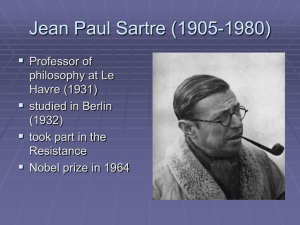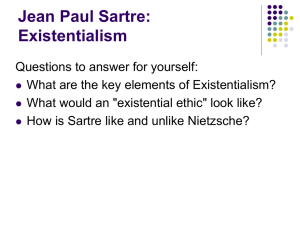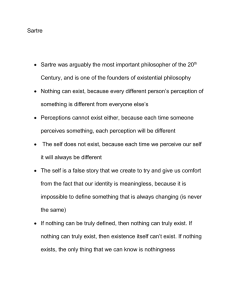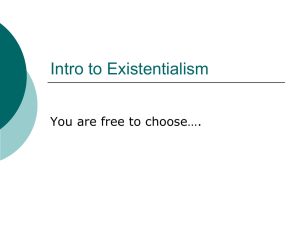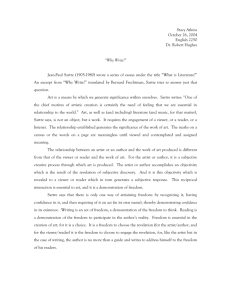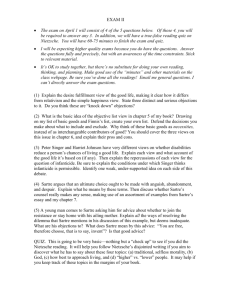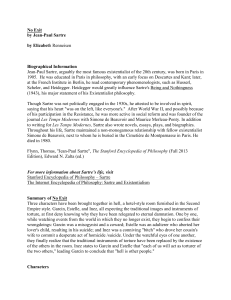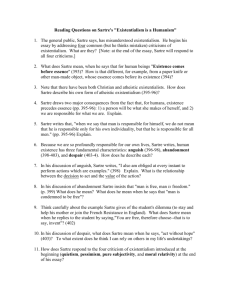Sartre - WordPress.com
advertisement
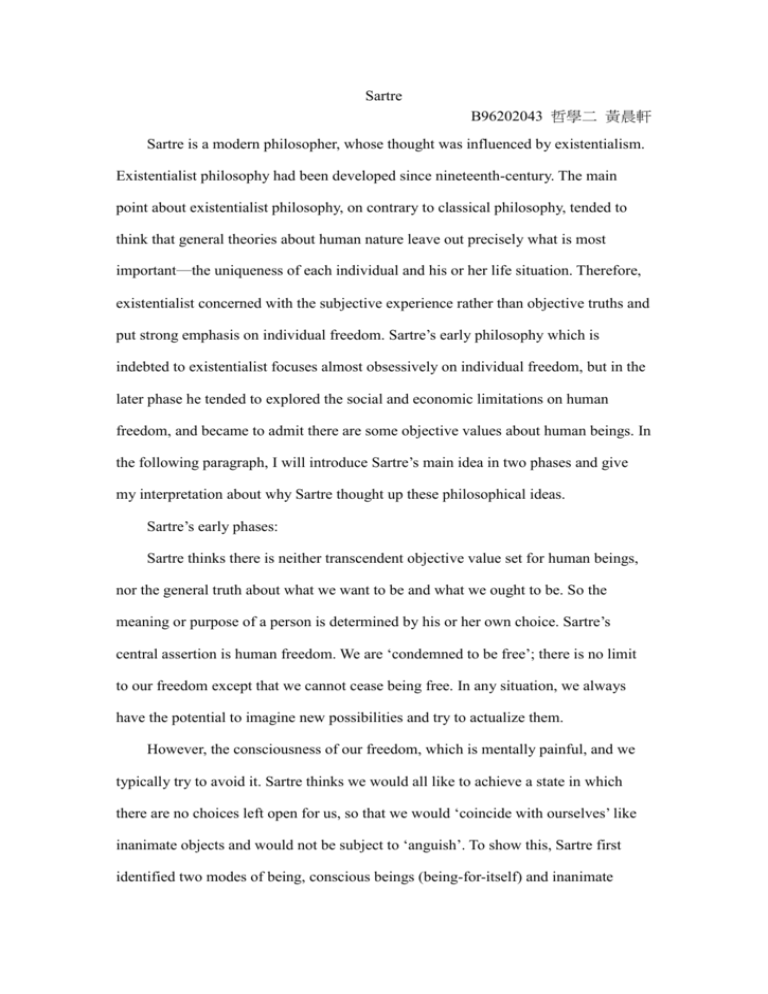
Sartre B96202043 哲學二 黃晨軒 Sartre is a modern philosopher, whose thought was influenced by existentialism. Existentialist philosophy had been developed since nineteenth-century. The main point about existentialist philosophy, on contrary to classical philosophy, tended to think that general theories about human nature leave out precisely what is most important─the uniqueness of each individual and his or her life situation. Therefore, existentialist concerned with the subjective experience rather than objective truths and put strong emphasis on individual freedom. Sartre’s early philosophy which is indebted to existentialist focuses almost obsessively on individual freedom, but in the later phase he tended to explored the social and economic limitations on human freedom, and became to admit there are some objective values about human beings. In the following paragraph, I will introduce Sartre’s main idea in two phases and give my interpretation about why Sartre thought up these philosophical ideas. Sartre’s early phases: Sartre thinks there is neither transcendent objective value set for human beings, nor the general truth about what we want to be and what we ought to be. So the meaning or purpose of a person is determined by his or her own choice. Sartre’s central assertion is human freedom. We are ‘condemned to be free’; there is no limit to our freedom except that we cannot cease being free. In any situation, we always have the potential to imagine new possibilities and try to actualize them. However, the consciousness of our freedom, which is mentally painful, and we typically try to avoid it. Sartre thinks we would all like to achieve a state in which there are no choices left open for us, so that we would ‘coincide with ourselves’ like inanimate objects and would not be subject to ‘anguish’. To show this, Sartre first identified two modes of being, conscious beings (being-for-itself) and inanimate beings (being-in-itself). Being-for-itself has awareness of itself and tendency to distinguish other things from itself as object. In contrast, being-in-itself involves no awareness of anything, and no conception of itself. Anguish, which we want to avoid, just comes from the self-awareness about our freedom. It is the uneasy awareness of the ultimate unpredictability of one’s own behavior. For example, a soldier fears injury, pain, or death, but he feels anguish when he wonders whether he is going to be able to ‘hold up’ courageously in the coming battle. Because when he reflective apprehends of his freedom, he can’t predict what he will choose in coming every moment, so he feels anguish. Sartre’s gloomy description of our life is ‘an unhappy consciousness with no possibility of surpassing its unhappy state’. In order to escape anguish, people try to represent one’s attitudes and actions as not determined by one’s own choices, but determined by one’s situation, one’s character, one’s relationship to others, social role, and so on. Sartre calls this ‘bad faith’. However, on the other hand, the concept ‘good faith’ presents a conceptual problem. Sartre displays an inordinate fondness for the paradoxical formula that ‘human reality must be what it is not, and not be what it is’. According to this idea, a man is in good faith should always try to become different form who he is, but it is almost impossible and foolish. A comprehension of this paradoxical sentence is ‘people are not necessarily what they are, but must be able to become what they are not yet’. So ‘good faith’ means we are free to try to become different from what we are. We must accept our responsibility for everything about ourselves. Sartre’s later phases: Sartre came to recognize more explicitly how human freedom is situated in the midst of what he calls ‘facticity’, the facts about oneself and one’s situation that constrain the ways in which one can express one’s freedom. Therefore, the freedom of individual thus becomes Sartre’s basic value. Every conscious being is free in the abstract sense. However, human society should be changed in the direction of making this a reality for everyone that everyone be able to exercise his or her freedom in concrete ways. And the responsibility for one’s own free choices must involve respecting the freedom of all other conscious beings. Sartre now defines man, not as a free consciousness, but as an embodied animal with rational thought. And there is a dialectical relationship between human beings, the nature world, and the social world. We are strongly influenced by the past of our culture, by the social class we are encultrued into, and by the idiosyncrasies of our family. Accordingly, Sartre looks to social action in particular to organized, ‘pledged’ groups committed to social and political change, to concrete human freedom for the oppressed. On the other hand, Sartre also hoped to find a level of ethical thought about society that is not merely conditioned by the prevailing economic structure, yet not totally abstract and unrelated to social reality. Hence he focuses on human needs, as setting us objective values that ‘demand’ to be fulfilled. The concept about Human needs is flexible enough to cover several levels, including physiological needs, psychological needs, education and culture, individuality recognized, to contribute to society, and finally seeking the meaning and purpose to their lives. Sartre now identifies human’s religious instinct not as the aspiration to become God, but the desire for our lives that could only come from an almighty loving God. However, Sartre continues to hold that this is an illusion and that only we ourselves can confer meaning and purpose on our lives and on the world. To sum up, in Sartre’s early phase, he thought freedom as curse. People want to lose freedom but they can’t. In the later phase, he thought freedom as gift. However, People want to get freedom but they can’t. In my interpretation, I guess that in Sartre’s early phase, he was unhappy and lack of normal needs. Nevertheless, to complain about circumstances or other people is useless. So to inspire himself, he should claim that he has responsibility for everything about himself. Hence he thought freedom as curse. In his later phase, his some needs became fulfilled, thus he acknowledge there are objective values about human beings. And because he had enough resources and social supports, he sympathized his early phase. He objectively comprehended the situation which limits his freedom and then looks to social action. The idea run through his philosophy is that we should use our freedom to change ourselves for the better. However, for an unfortunate man, he should struggle as if he is free and he has responsibility for everything about himself. On the other hand, for the upper class in the society, they should work toward an ideal society in which all people can exercise their freedom.

